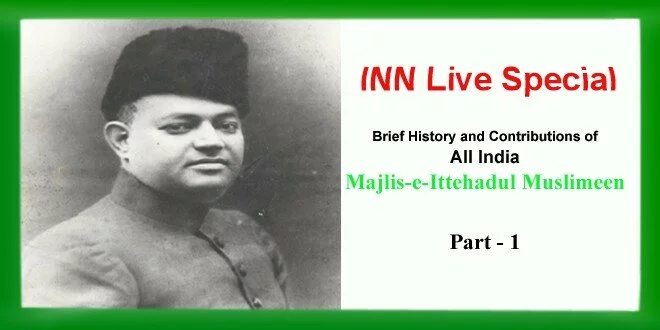Today at least one among three Muslims in Hyderabad is an active worker or closely associate himself with All India Majlis-e-Ittehadul Muslimeen. Thousands of people attend the party’s meetings. Hundreds participate in the rallies and almost all Muslim youth relate themselves with the party’s leadership in one way or the other.
However, the scene was entirely different when the party was revived in 1957. The Police Action or the Operation Polo of 1948 had left so deep wounds on the mindset of Muslim community that it was afraid of taking the name of MIM or re-establishing its binding with the party. Lakhs of Muslim were massacred during and after the Police Action. Thousands of rich, elite and educated Muslims fled to Pakistan. Muslim properties were confiscated through new legislations.
Thousands of jobs were lost and according to a survey, almost 40 per cent of rickshaw-pullers in Hyderabad were the employees of erstwhile Nizam Government. The community was left at the mercy of politicians belonging to Congress or communists, with both having criminal record of being anti-Muslim.
The Police Action has completely changed the fate of Hyderabadi Muslims. They were openly humiliated on the streets of Hyderabad. Lakhs of Muslims became refugees in their own motherland. They were deprived of jobs, education and other resources. This was the first gift of democracy that they got in independent India. These acts completely paralysed the Muslim community.
Immediately after the Police Action, the Congress imposed some leadership upon Musilms. In the first three elections held in 1952, 1955 and 1957, the participation of common Muslims in elections was almost nil. It nominated some Muslims as its candidates from various assembly and Lok Sabha seats and since it was the only major party, almost all of them got elected. But those elected representatives did not represent the community. More than leaders, they were slaves of Congress. They never tried to revive the confidence of Muslims that they lost in Police Action. Neither Muslims nor those leaders associated themselves with each other. The condition of Muslims in other districts was even worse. Congress ensured that the voice of Muslims remain suppressed.
Muslims had no leader who could address their problems. The communists tried in vain to fill the void. Though a few of them were successful at lower levels, Congress ensured that the community gets no leader at the State level.
In 1957, Qasim Rizvi was released from jail. He was given a period of 48 hours to migrtate to Pakistan. But before leaving the country forever, he wanted to give the leadership of MIM to someone. However, he realised that things have changed for worse during his imprisonment for nine years in Pune’s jail. The MIM ceased to exist and people were afraid of even uttering its name fearing consequences.
Qasim Rizvi held a meeting with the Muslim leaders. But on one was willing to accept the leadership of MIM. Finally, it was Fakhr-e-Millat Moulana Abdul Wahed Owaisi, a lawyer by profession, who agreed to revive the party.
Moulana Abdul Wahed Owaisi then started conducting public meetings in Hyderabad. Initially, fear prevented Muslims from participating in those meetings. But slowly the trend changed and hundreds of Muslims started attending them.
Going by the response, Abdul Wahed Owaisi decided to enter electoral politics. On 2nd March 1958, in a grand public meeting, he announced the change of party’s name by replacing “Mamlikat” (State) with “Kul Hind” (All India) Majlis-e-Ittehadul Muslimeen in accordance with the Constitution of India. The Congress however, did not like this.
A few months later, on 14th September 1958, Abdul Wahed Owaisi was arrested and sent to Chanchalguda Jail. He was kept in solitary confinement for about 11 months without any charge and was later even invited to Delhi and offered central ministership post by the then Prime Minister Pandit Jawaharlal Nehru. However, he refused to accept the post and continued his mission.
Abdul Wahed Owaisi raised hopes that Muslims can emerge as a politicial power. He knew that it was only through political power that the Muslims could get justice in a democratic country.
The beginning was made in 1960 when the MIM won 19 out of 30 seats of the Hyderabad municipal corporation. Sultan Salahuddin Owaisi too made his debut in electoral politics by winning Mallepalle seat by defeating Congress candidate M.M. Hashim. Two years later, in 1962, Sultan Salahuddin Owaisi won the Pathergatti assembly seat signalling the beginning of a new era. Then there was no looking back.
To prove what Muslims could do with political power, after winning the municipal elections in 1960, the MIM passed a resolution in the municipal corporation abolishing the tax on cycle-rickshaws and cycles. This move helped thousands of poor people in the city, especially the Muslims.
(To Be Continued)
 INN Live Urdu News Channel – India Breaking News, Headlines, Hyderabad اردو خبریں
INN Live Urdu News Channel – India Breaking News, Headlines, Hyderabad اردو خبریں


